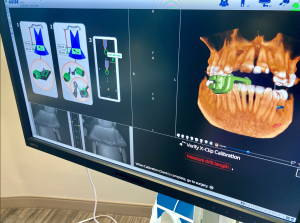Nail biting is an extremely common habit for many people. For some, it’s a subconscious expression of stress while others will do it absentmindedly when they’re bored. Whatever the reason, nail biting isn’t the best way to give yourself a manicure. Not only is it unhygienic, it can also do some real damage to your teeth. How? Let Parkcrest Dental Group explain. If you’re someone who habitually chews their nails, Parkcrest Dental Group can explain how you might end up needing dental treatment later on.
Chips, Fractures and Enamel Damage
Parkcrest Dental Group has seen plenty of patients for cosmetic dentistry to fix chipped and fractured teeth. One of the surprisingly common causes is persistent nail-biting. When you’re chewing your nails, you’re biting through something very small and hard.
This puts pressure on a small part of your tooth, which is more likely to cause it to weaken and crack. You’re also more likely to accidentally bite your teeth together rather than the nail, potentially causing more damage.
Related Post: Pediatric Dentist: Common Causes Of Tooth Damage
Gum Disease and Infections
Your nails are filthy. This isn’t just an accusation from Parkcrest Dental Group — they just are. In fact, everyone’s are. With everything our hands and fingers come into contact with every day, it’s impossible to keep them totally clean. Even regular hand washing and using sanitizer is no guarantee of keeping them germ-free.
When you’re biting your fingernails or fingers, you’re potentially introducing a lot of harmful bacteria to your mouth. For the most part, your body’s immune system will adapt to take care of it, but that doesn’t necessarily protect your gums. Any open cuts in your gums or cavities in your teeth are vulnerable to infection, and biting your nails increases the chances of that happening dramatically.
Related Post: Gum Disease
Bruxism
Bruxism is the technical name for tooth-grinding while you sleep. There are several links between Bruxism and nail biting. Many people who bite their nails do so out of anxiety, which makes nighttime teeth grinding more likely. In other cases, nail biting conditions you to grind your teeth unconsciously, which will happen whether you’re asleep or awake. Habitual teeth grinding wears away your enamel and leads to painful, long-term problems.
Damaging Your Fingers
It’s not just your teeth that suffer when it comes to nail biting. Biting your nails down to the quick is painful, and your nails will grow further back the more you bite them. Biting the skin too, which is also common with nail-biting, leads to open cuts and calluses. Ultimately, nail biting is something that you should seek help for if you’re unable to stop, and there are plenty of resources out there to guide you in breaking the habit.
Related Post: General Dentistry: Teeth Grinding Prevention
Get the Best In Dental Solutions at Parkcrest Dental Group
While the professional team at Parkcrest Dental Group can’t stop you biting your nails, we can provide you with the best dental solutions. Whether you’re looking for orthodontic treatment, pediatric dentistry or cosmetic dentistry, contact us about our general dentistry services today.





